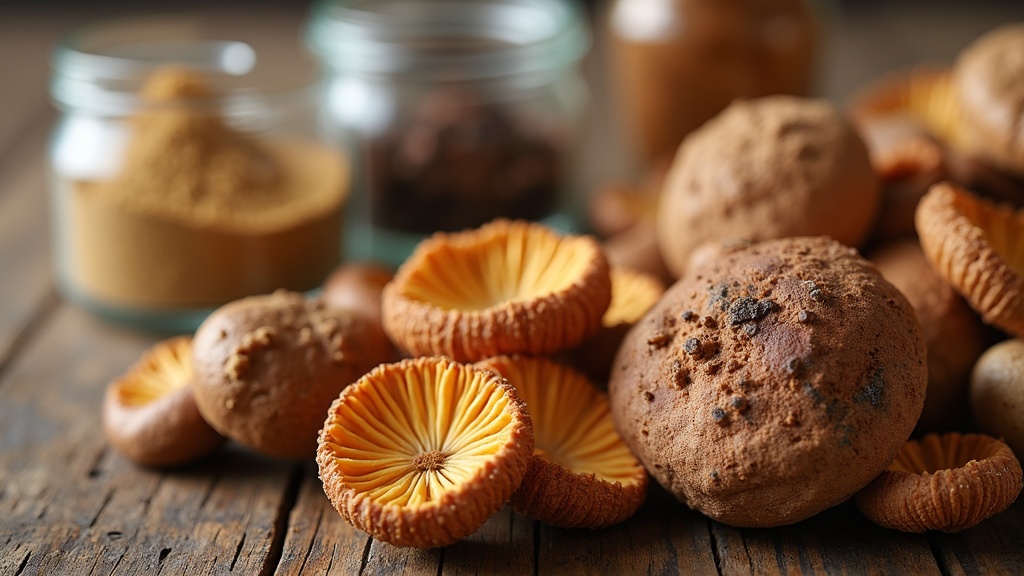Mushroom-based immune boosters are generating a lot of interest among those searching for natural ways to support good health. My curiosity about these supplements started when I wanted a gentle approach to keep my immune system on track—especially when cold and flu season rolls around. These products take advantage of unique mushrooms packed with compounds that work alongside our body’s immune response. Whether you want a bump in your day-to-day routine or simply want to figure out what makes these fascinating fungi so special, it’s important to get a handle on how they function and which ones are popular with users.

What Are Mushroom-based Immune Boosters?
Mushroom-based immune boosters are supplements, powders, or extracts created from mushrooms containing natural ingredients with immune-supporting properties. In my own research, I found that these boosters provide things like polysaccharides, betaglucans, and antioxidants, which help keep immune cell activity balanced, promote healthy inflammation levels, and support the body’s natural defense system. Unlike medications that push your body in a specific direction, mushroom supplements aim for gentle balance, working naturally over time.
People lean toward mushroom-based boosters because they come from plants, are usually easy on the system, and have a long record in traditional wellness routines. They work for folks who want ongoing support and those preparing for stressful moments, travel, or a seasonal cold snap. There’s something for everyone, as they’re sold in a range of forms, each fitting into everyday routines with little trouble.
Popular Mushrooms in Immune Health (and Why They Work)
Certain mushrooms rise to the top for their immune-supporting effects, both in personal stories and in research reviews. After checking into the science and trying some out myself, here are the big names:
- Reishi (Ganoderma lucidum): Often called the “mushroom of immortality,” Reishi is prized for its soothing effects on the immune system. Its mixture of polysaccharides and triterpenes is believed to tone down overactive responses, help the body respond to stress, and encourage immune balance over the long run. Many people make it a foundational part of their daily routine.
- Shiitake (Lentinula edodes): As more than just a tasty ingredient, Shiitake supplies lentinan, a naturally occurring compound explored for its immune benefits. I appreciate that Shiitake also delivers an array of vitamins and essential minerals, contributing to allaround wellness.
- Maitake (Grifola frondosa): With its signature betaglucan called Dfraction, Maitake may prompt specific white blood cells known as macrophages to spot and address invaders efficiently. Some folks find this mushroom useful as part of an immune blend, especially when combined with others.
- Turkey Tail (Trametes versicolor): Bursting with compounds like PSP and PSK, Turkey Tail is a staple in immune blends worldwide. These ingredients are still the subject of research, but early findings are promising for supporting immune cell activity.
- Cordyceps (Cordyceps sinensis & militaris): Often found in products for energy and stamina, Cordyceps also harbors elements that affect the body’s natural barriers, promoting readiness during physical stress. My own experience with Cordyceps has been positive, especially when I needed an energy and wellness boost during tough weeks.
- Lions Mane (Hericium erinaceus): Besides its brainboosting rep, Lion’s Mane has ties to immune wellness. Its influence on gut health offers indirect and direct immune support, as a major chunk of our body’s defenses resides in the digestive tract.
The buzz around these mushrooms continues to build in scientific circles. More studies pop up each year, and although it’s clear they’re not miracle cures, the steady daily use seems to offer benefits you can feel—if you give it time and have realistic expectations.
Common Supplement Formats for Immune Health
Supplements come in lots of shapes and sizes, but with mushrooms, these are the ones I see everywhere (in stores and online):
- Powders or capsules featuring one mushroom: These let you test out your reaction to, say, Reishi by itself before mixing things up with others. If you’re interested in just one specific benefit, this is the easiest way to track changes.
- Mixed mushroom blends: Most immune formulas combine several varieties—think a blend with Reishi, Turkey Tail, and Shiitake. This approach provides a broad set of nutrients and is popular for those wanting balanced, mild support.
- Liquid tinctures and extracts: Ideal for adding to drinks or taking directly, tinctures offer high potency and are easy to use on the fly. I often toss one in my travel bag for immune upkeep on the go.
Labels that show “fruiting body extract” and list betaglucan levels are usually a green flag for potency. I always check for clear sourcing and transparent processing details from any brand I buy.
Choosing Your Format: What Suits Your Routine?
The best way to add mushroom immune supporters comes down to how you want them to fit into your life. Here are the top forms you’ll likely run into:
- Capsules: These are ultra convenient, keep dosages steady, and can hide odd flavors. On busy days, I grab a couple with food and keep going.
- Powders: Powders are good for mixing in hot drinks, smoothies, or food. If you’re looking to combine multiple mushrooms, powders make it straightforward. They also let you shift serving size depending on your needs.
- Liquid extracts/tinctures: Highly concentrated, absorbing quickly and perfect for anyone who wants to avoid swallowing pills. I sometimes use tinctures for faster effects or while I’m on the road.
Quality doesn’t depend on the form; it’s all about how the product is made and whether all the good stuff is present. For me, the choice varies—powders land in my morning smoothies, capsules in my car for work, and tinctures in my bag for travel. Flexibility is key, so play around and see what feels best for you.
Smart Choices: Quality, Dosage, and Safety
When adding anything new, you want to be smart about it. Here’s what I keep in mind when picking a mushroom supplement:
- Quality and purity: I look for brands that do third party lab checks and show precisely which parts of the mushroom they use. Fruiting body extracts generally mean more punch compared to mycelium based products. If you like keeping things clean, opt for organic-choice supplements, as they have lower pesticide risks.
- Getting the serving right: Serving size can make or break results. Always follow what’s on the label, then track for any unwanted effects. It makes sense to start small if you’re fresh to mushrooms and only go bigger if your body feels good about it. Companies sometimes offer guidance for newcomers—always a nice touch.
- Watch out for sensitivities and interactions: Just because it’s plant based doesn’t mean it’s risk free. People with autoimmune diseases or those on immune suppressing medication should check with their doctor first. I make it a habit to share new supplements with my healthcare provider, especially if prescription drugs are in play.
- Proper storage: Store these products in a cool, dry, and dark place to keep them fresh and effective. Sealed packages and a little attention to storage help keep everything in top shape.
I also pay attention to user reviews and word of mouth suggestions. More than once, reading honest experiences helped me avoid products that didn’t live up to their claims. Pairing these boosters with good sleep, a sound diet, and smooth stress management makes the overall impact that much better.
Frequently Asked Questions
I run into many folks curious about how to use mushroom-based immune boosters. Here’s what they ask most often:
Question: Can I take mushroom immune supplements daily?
Answer: Absolutely. They’re made for everyday use, but always pay attention to how your body responds and stick to label advice. Your experience might differ from others’—that’s perfectly normal.
Question: Are these products suitable for kids?
Answer: Research on children is limited, so it’s best to double check with a trusted pediatrician. There are some child friendly formulas out there, but professional guidance is a must.
Question: Can I combine mushrooms with other immune supporters, like vitamin C or zinc?
Answer: Many people do. I sometimes stack mushrooms with vitamin C, zinc, or probiotics, but if you use other prescriptions, ask about possible cross reactions before adding them to your lineup.
Mushroom-based immune boosters can be a practical tool in keeping your body ready for daily challenges—especially when combined with smart choices and consistency. As I learned for myself, taking some time to check products, try a couple of types, and notice real changes can pay big health dividends. Modern research supports what traditional societies have known for centuries: These unique mushrooms offer real, approachable wellness support for day-to-day living.
